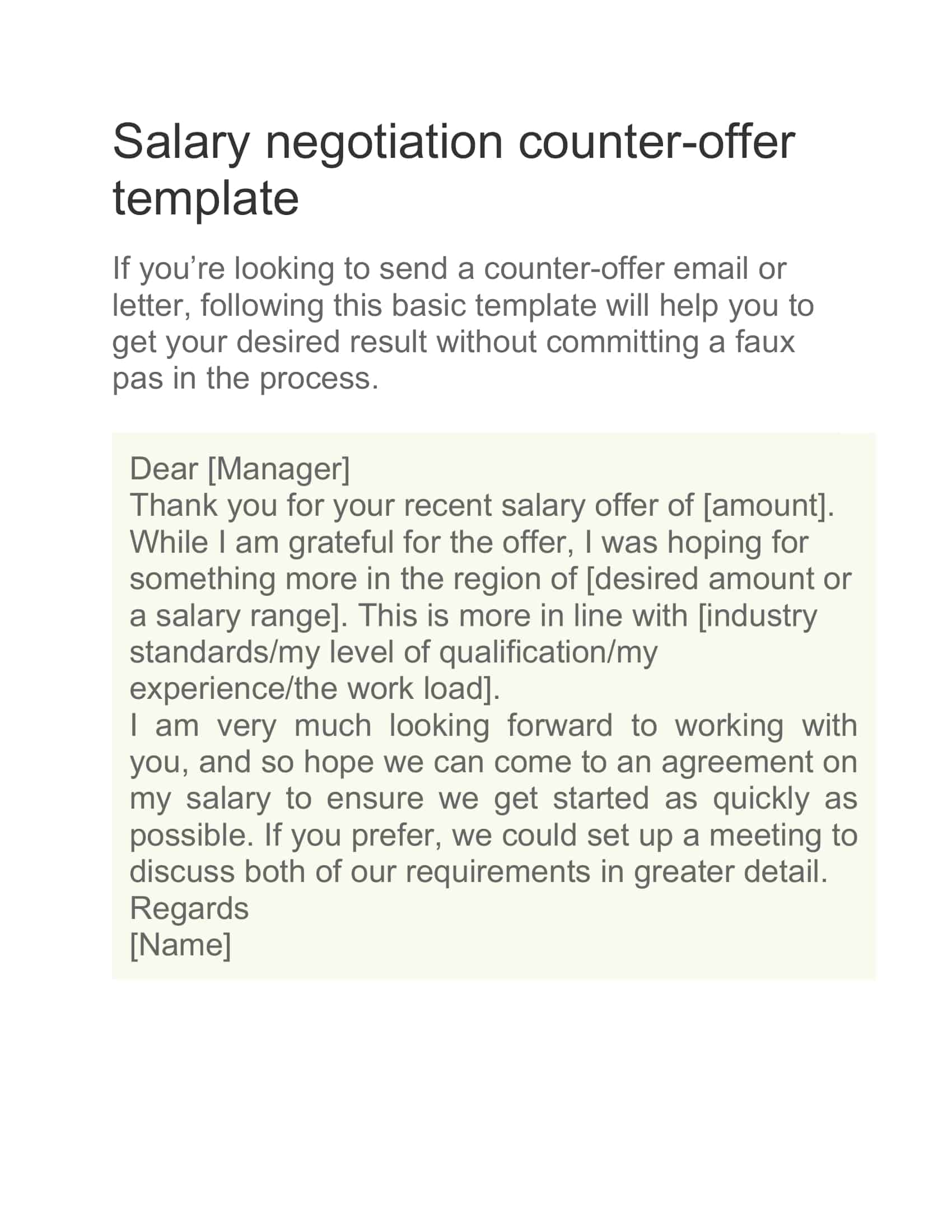Beyond The 'Best And Final' Offer: Strategies For Salary Negotiation

Table of Contents
Understanding Your Worth: Research and Preparation is Key
Before you even enter a salary negotiation, thorough research and preparation are paramount. Knowing your worth is the foundation of a successful negotiation.
Researching Industry Benchmarks
Understanding the market value of your skills is essential. This involves:
- Utilizing Salary Comparison Websites: Leverage resources like Glassdoor, Salary.com, Payscale, and LinkedIn Salary to research salary ranges for similar roles in your location.
- Analyzing Job Descriptions: Carefully examine job descriptions for comparable positions to identify required skills and experience, which will help you understand how your skills align with market demands.
- Networking: Connect with professionals in your field through LinkedIn or industry events to gather insights into real-world salary expectations. Informal conversations can reveal valuable information not found online.
- Considering Location and Cost of Living: Remember that salary expectations vary significantly based on geographic location. Adjust your expectations based on the cost of living in the area.
Quantifying Your Achievements and Skills
Don't just list your responsibilities; quantify your accomplishments. This demonstrates your value to a potential employer.
- Create a Detailed Accomplishments List: For each role, list quantifiable achievements. Instead of "Managed social media," say "Increased social media engagement by 30% in six months, resulting in a 15% increase in leads."
- Highlight Transferable Skills: Identify skills relevant to the target role, even if they were developed in previous positions. Emphasize how these skills can benefit your new employer.
- Prepare Specific Examples: Prepare compelling examples illustrating your skills and accomplishments. These examples will be crucial during the negotiation process.
Defining Your Salary Expectations
Based on your research, define a realistic salary range.
- Research Salary Ranges: Use your research to determine a realistic salary range for the position and your experience level.
- Develop a Range: Establish a minimum and maximum acceptable salary. Having a range gives you flexibility during negotiations.
- Consider Non-Salary Benefits: Remember that total compensation includes more than just base salary. Consider benefits like health insurance, retirement contributions, paid time off, and other perks.
Negotiating Effectively: Tactics and Techniques
Effective communication and strategic tactics are crucial for a successful negotiation.
Mastering the Art of Communication
Your communication style significantly impacts the negotiation outcome.
- Maintain Confidence and Professionalism: Project confidence without being aggressive. Maintain a professional and respectful demeanor throughout the process.
- Use "I" Statements: Frame your needs and desires using "I" statements to avoid sounding accusatory or demanding. For example, "I'm looking for a salary within the range of X to Y, based on my experience and the market rate."
- Actively Listen: Pay close attention to the employer's perspective and concerns. Understanding their viewpoint helps you tailor your arguments effectively.
- Practice Your Negotiation Points: Rehearse your negotiation points beforehand to ensure you communicate clearly and confidently.
Handling "Best and Final" Offers
A "best and final" offer doesn't always mean it's truly final.
- Express Disappointment Professionally: Acknowledge the offer but politely express your disappointment if it doesn't meet your expectations.
- Reiterate Your Value: Re-emphasize your skills, experience, and contributions, highlighting why you're worth more.
- Explore Alternative Benefits: If the salary is non-negotiable, explore other benefits such as flexible work arrangements, professional development opportunities, or a signing bonus.
- Be Prepared to Walk Away: Know your bottom line and be prepared to walk away if the offer consistently falls short of your minimum requirements.
Leveraging Your Strengths
Highlight what makes you unique and valuable to the company.
- Showcase Unique Skills: Focus on your unique skills and experience that set you apart from other candidates.
- Emphasize Your Potential Contribution: Explain how your skills and experience will contribute to the company's success.
- Use Data to Support Your Claims: Whenever possible, use data to support your claims about your past performance and potential future contributions.
Beyond the Salary: Negotiating Total Compensation
Total compensation encompasses more than just your base salary.
Benefits Negotiation
Negotiate the entire benefits package, not just the salary.
- Health Insurance, Retirement Plans, Paid Time Off: Understand the value of the health insurance plan, retirement contributions (401k matching), and paid time off offered.
- Overall Value of the Benefits Package: Consider the total value of the benefits package to determine its overall worth.
Bonuses and Stock Options
Explore potential bonuses and equity compensation.
- Performance-Based Bonuses: Negotiate for performance-based bonuses tied to achieving specific goals.
- Stock Grants or Equity: In some cases, you might negotiate for stock options or equity in the company.
Other Perks
Consider negotiating additional perks to enhance the overall compensation package.
- Professional Development Opportunities: Negotiate for opportunities for professional development, such as training courses or conferences.
- Flexible Work Arrangements: Explore options for flexible work arrangements, such as remote work or flexible hours.
- Relocation Assistance: If applicable, negotiate for relocation assistance to cover moving expenses.
Conclusion: Mastering the Art of Salary Negotiation
Successfully navigating salary negotiations requires preparation, effective communication, and a clear understanding of your worth. Remember, even a "best and final" offer is often negotiable. By quantifying your achievements, mastering communication techniques, and considering the total compensation package, you can significantly improve your chances of securing a fair and competitive salary. Don't settle for less than you deserve. Use these strategies to confidently navigate your next salary negotiation and go beyond the "best and final" offer!

Featured Posts
-
 The Whos Roger Daltrey A Look At His Health Challenges At Age 81
May 23, 2025
The Whos Roger Daltrey A Look At His Health Challenges At Age 81
May 23, 2025 -
 Kermits Commencement Speech Key Takeaways For University Of Maryland Graduates
May 23, 2025
Kermits Commencement Speech Key Takeaways For University Of Maryland Graduates
May 23, 2025 -
 Tva Group Job Cuts Impact Of Streaming Services And Regulatory Changes
May 23, 2025
Tva Group Job Cuts Impact Of Streaming Services And Regulatory Changes
May 23, 2025 -
 Englands Injury Woes Continue Ahead Of Zimbabwe Tour
May 23, 2025
Englands Injury Woes Continue Ahead Of Zimbabwe Tour
May 23, 2025 -
 En Tutumlu 3 Burc Paranizi Nasil Koruyorlar
May 23, 2025
En Tutumlu 3 Burc Paranizi Nasil Koruyorlar
May 23, 2025
Latest Posts
-
 Solving The Marvel The Avengers Crossword Clue A Complete Guide
May 23, 2025
Solving The Marvel The Avengers Crossword Clue A Complete Guide
May 23, 2025 -
 Nyt Mini Crossword April 6 2025 Hints And Answers
May 23, 2025
Nyt Mini Crossword April 6 2025 Hints And Answers
May 23, 2025 -
 Nyt Mini Crossword Solution Marvel The Avengers Clue May 1
May 23, 2025
Nyt Mini Crossword Solution Marvel The Avengers Clue May 1
May 23, 2025 -
 March 13 Nyt Mini Crossword Answers Hints And Solving Tips
May 23, 2025
March 13 Nyt Mini Crossword Answers Hints And Solving Tips
May 23, 2025 -
 Nyt Mini Crossword Solution March 13 Hints And Complete Answers
May 23, 2025
Nyt Mini Crossword Solution March 13 Hints And Complete Answers
May 23, 2025
